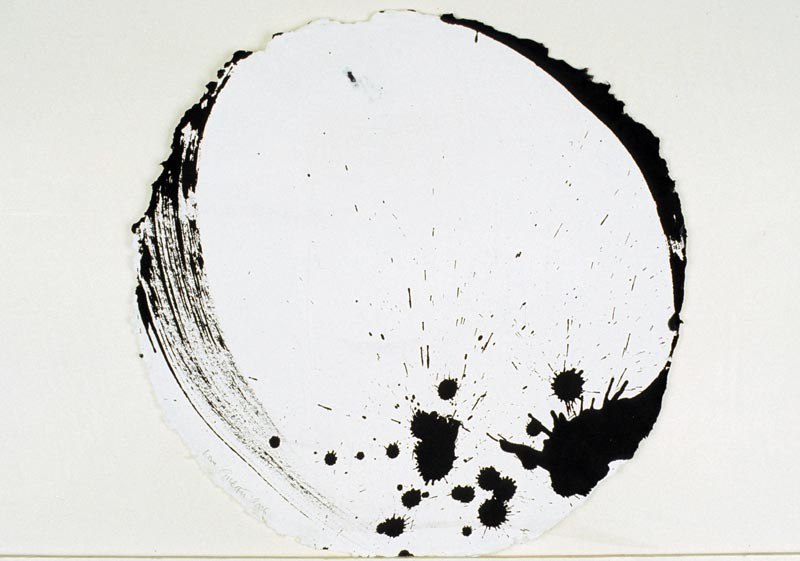Not Exactly Mundane
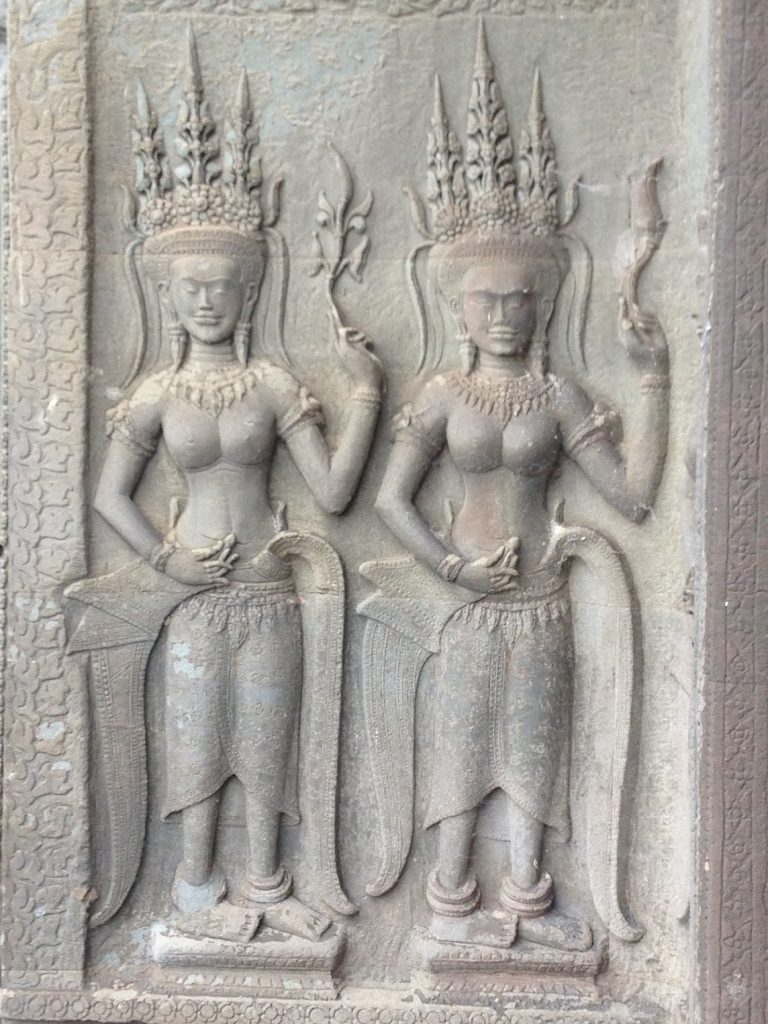 Last night I got a great email from one of my CDL (Community Dharma Leader) colleagues, Tsu-Yin, who has been practicing at various monasteries in Burma and Thailand for the past year. She included a link to some of her photos and a “Record of Mundane Thoughts” — notes to herself that she kept over much of that time (quite a lot of which was spent at U Tejaniya’s monastery where I stayed for a couple of weeks back in 2014).
Last night I got a great email from one of my CDL (Community Dharma Leader) colleagues, Tsu-Yin, who has been practicing at various monasteries in Burma and Thailand for the past year. She included a link to some of her photos and a “Record of Mundane Thoughts” — notes to herself that she kept over much of that time (quite a lot of which was spent at U Tejaniya’s monastery where I stayed for a couple of weeks back in 2014).
So reading it was quite a sweet little memory trip for me and an inspiration, too, as I start to prepare for my 2-month retreat at Spirit Rock (Jan 28-Mar 25).
With deep bows to Tsu-Yin, here are just a few of her not-exactly-mundane “Mundane Thoughts”:
* Enjoyment and agitation are opposite ends of the same stick. Think you can take only the delightful and leave the hideous? Impossible! You pick up the stick, you’re stuck with both. You must put down the stick. GO BEYOND THE STICK.
* Happiness —> Concentration
* Good news is that when we keep still, samadhi comes on its own, because it was never something outside of us. Can’t even go out and buy it in a store– it’s free!
* Everything is part of waking up. Every act without attachment. But you wake up at the speed you wake up. Recognize that, and you’re golden.
* Is Row Row Row Your Boat some sort of Song of Enlightenment?! I can’t be the first to have wondered this.
***
Sadhu. Sadhu. Sadhu.
Aware of the Suffering
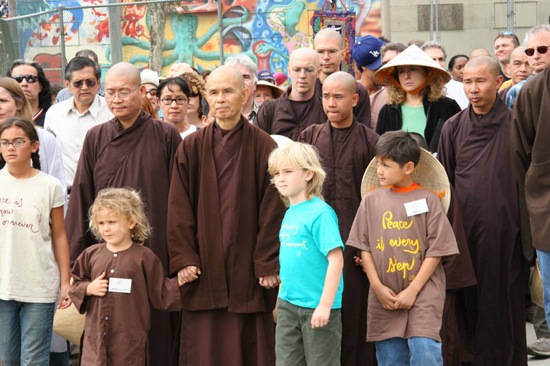 At yesterday’s Sunday Sangha, I read from Thich Nhat Hanh’s 5 Mindfulness Trainings — his modernized translation of the 5 Precepts (training practices from the time of the Buddha). Given the social environment we find ourselves facing right now, I focused mainly on the second precept, traditionally understood as the practice of “abstaining from taking that which is not given.”
At yesterday’s Sunday Sangha, I read from Thich Nhat Hanh’s 5 Mindfulness Trainings — his modernized translation of the 5 Precepts (training practices from the time of the Buddha). Given the social environment we find ourselves facing right now, I focused mainly on the second precept, traditionally understood as the practice of “abstaining from taking that which is not given.”
Here is Thich Nhat Hanh’s version:
“Aware of the suffering caused by exploitation, social injustice, stealing, and oppression, I am committed to practicing generosity in my thinking, speaking, and acting. I am determined not to steal and not to possess anything that should belong to others; and I will share my time, energy, and material resources with those who are in need.
“I will practice looking deeply to see that the happiness and suffering of others are not separate from my own happiness and suffering; that true happiness is not possible without understanding and compassion; and that running after wealth, fame, power, and sensual pleasures can bring much suffering and despair.
“I am aware that happiness depends on my mental attitude and not on the external conditions, and that I can live happily in the present moment simply by remembering that I already have more than enough conditions to be happy. I am committed to practicing Right Livelihood so that I can help reduce the suffering of living beings on the Earth and reverse the process of global warming.”
***
I undertake this Precept. Which, in my understanding, includes taking action — political action — to oppose the social injustice I see gaining power in this country and around the world.
I Do Not Let My Mind Shut Down
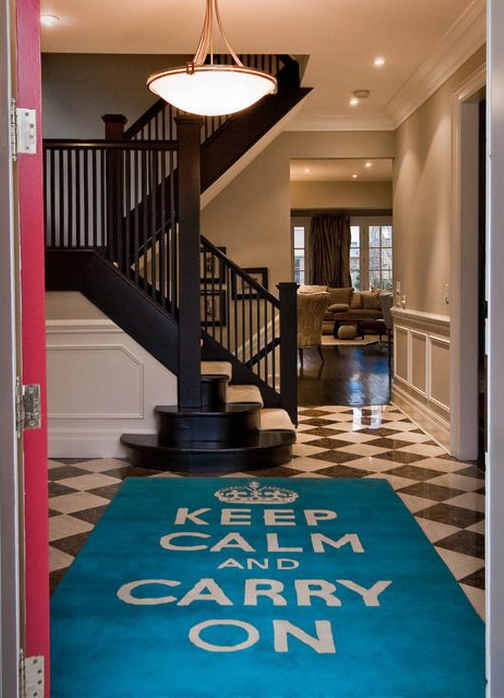 *** Note: I have a writing project due tomorrow and then I’m leaving town on Tuesday and Wednesday for a visit with Mirabai, so I won’t post again until late next week, or maybe not till the following Monday, so check back then. Or better yet, sign up to get these posts delivered to your email by subscribing to the blog (see side bar). ***
*** Note: I have a writing project due tomorrow and then I’m leaving town on Tuesday and Wednesday for a visit with Mirabai, so I won’t post again until late next week, or maybe not till the following Monday, so check back then. Or better yet, sign up to get these posts delivered to your email by subscribing to the blog (see side bar). ***
Last night I listened to a talk by Ajahn Sucitto, titled Keep Calm and Carry On, which he gave last May at the end of a long retreat about “going back out into the world.” He talks about taking a pause in the middle of difficulties — even just for 10 seconds — to touch into our own place of fundamental goodwill by recalling:
I do not let my mind shut down with fear.
I do not let my mind shut down with resentment.
I do not let my mind shut down with impatience.
It’s a very helpful talk. There’s a bit of untranslated Pali and some references to topics he’s been talking about with this group for almost a month (so it’s a little like dropping into the middle of an on-going conversation) but don’t let that put you off. It’s a great support. Click here to listen.
“Yet”
 My mentor Mirabai Bush has an article in the current issue of Mindful magazine, titled Passion Rules. It includes a set of mindful investigation practices aimed at clarifying values, identifying obstacles and developing skills for waking up to a more value-driven life. For example:
My mentor Mirabai Bush has an article in the current issue of Mindful magazine, titled Passion Rules. It includes a set of mindful investigation practices aimed at clarifying values, identifying obstacles and developing skills for waking up to a more value-driven life. For example:
What really matters to you in your life?
Practice: Think of an object related to your values and how it might be utilized thorough a vocation or avocation. Sit quietly, breathe in and out, holding the object in your mind, and see what arises. Allow its story to unfold without judgment.
What is in the way of living in alignment with those values?
Practice: Contemplate that question. Listen for how to overcome these obstacles. When negative judgments arise — I can’t start my own business because I don’t have the skills — try using the word “yet.” I don’t have them yet.
What do you do really well, and is there space for you to do it?
Practice: Imagine yourself as a child. What did you love to do and what did you know you were good at? Let images arise. Remember how it felt. Ask: Is it still true? What else is true now? Then identify the skills you’ll need to bring that latent passion back to life.
I Am of the Nature to Have Ill Health
 I’m trying not to be sick. I’ve had a sore throat for about 5 days. My eyes feel hot. And so does my face.
I’m trying not to be sick. I’ve had a sore throat for about 5 days. My eyes feel hot. And so does my face.
Now I’m starting to cough. And I can’t seem to muster the energy for a proper post.
So I think I’ll go to bed early.
May I be healthy.
And if not, may I remember that this is the way things are… and that it would be a good idea to drink plenty of liquids.
***
(image: rhino virus)
Traveling Metta
I’ll be leaving on Saturday for a week-long CDL (Community Dharma Leader) training retreat, which will be held at Garrison Institute on the bluffs overlooking the Hudson River, about an hour north of New York City. I love going to Garrison because the trip involves a gorgeous train ride (on the Hudson River Line), starting at Grand Central Station.
Which will be the perfect place to re-start a practice I used to do whenever I was traveling. I’d look around at people in airports or in cars on the highway or wherever I’d find myself when I was going from one place to another, and I’d say to them (silently) “may you be safe” or “may you be happy” or “peaceful” or “healthy” or whatever.
Sharon Salzberg calls this “Street Lovingkindness.” She made a series of great little videos about it….including one shot in Grand Central Station! It’s very inspiring. Check it out. (click here)
It Feels So Good to Feel Right
 There is a truly wonderful article in the e-newsletter sent out today by the Barre Center for Buddhist Studies (BCBS). The title is a bit off-putting: “Part 2 of a Two-Part Interview on Vedana with Bhikkhu Analayo” but it’s a fabulous read.
There is a truly wonderful article in the e-newsletter sent out today by the Barre Center for Buddhist Studies (BCBS). The title is a bit off-putting: “Part 2 of a Two-Part Interview on Vedana with Bhikkhu Analayo” but it’s a fabulous read.
Here’s a sample:
BCBS: “It’s not so uncommon for meditators to say things like, ‘Oh, that’s a view. That’s an opinion. I shouldn’t have those. I shouldn’t cling.’ Things can shift when we understand that there really is a payoff — we’re getting that pleasant feeling. Then maybe we can also understand, ‘Okay. There’s a reason why I’m doing this. There’s a reason why I’m clinging.’ Then it’s no longer a matter of being crazy or delusional or bad. Once we see what we’re getting out of something, we can decide whether or not it’s really worth what we’re giving up to get it.”
Ven. Analayo: “Yes. That’s exactly the point. And it’s a gradual path. It’s not that suddenly you have no more attachment to views. The point is just to be aware of it. That’s all. Every moment I’m aware of the hedonic part of my clinging is a moment when I’m learning to live with cognitive dissonance — learning to live with not being the way I would like to be. And this is precisely what I want. I want to be able to be with myself when I’m not the way I want to be. Because this is the reality of the present moment. And from there, step by step, the gradual improvement happens.”
BCBS: “So beautiful, Bhante. It’s easy to miss that part and think, ‘I’m not allowed to have strong views anymore. I shouldn’t form strong opinions.’ But looked at in this way, you can have strong views and opinions. It’s just a matter of not clinging to them.
Ven. Atalayo: “The Buddha had very strong views. When a monk would misrepresent his teaching, he’d call him and say, ‘You are a fool. What did you say? Did I ever teach that?’ Scolding him in front of everyone. And the monk sits there, shoulders drooping, head down, sad, unable to talk. The Buddha really lets him know it, but there’s no aversion there, no clinging. Now, we’re not in the position of the Buddha, and we don’t have to be so strong. But it’s not a matter of becoming blurry and not knowing what is right and wrong — that is not the point. The point is simply allowing the basic capacity of mindfulness to see the whole situation……
“And this is all based on feeling. It’s all based on this awareness of the hedonic side. Maybe we don’t catch it at the moment it happens in discussion, but we can see it afterwards. ‘Yes. At that point I got really excited. And I had all those strong feeling, and then I went really overboard with the way I was discussing it.’ Just acknowledge it. Not saying, ‘Oh, I shouldn’t have done it.’ No. Just being aware that this is how it happened. And the next time closer to it, closer to it, and eventually we’ll notice it right at the time it happens. And maybe at that time we can just let it go.”
***
To read the full interview, click here.
Intimate and Ultimate
So I’m thinking, after yesterday’s post, what else can I say about this new relationship I’ve discovered with the breath.
How about this:
from To Begin With, the Sweet Grass
by Mary Oliver
2.
Eat bread and understand comfort.
Drink water, and understand delight.
Visit the garden where the scarlet trumpets
are opening their bodies for the
hummingbirds
who are drinking the sweetness, who
are
thrillingly gluttonous.
For one thing leads to another.
Soon you will notice how stones shine
underfoot.
Eventually tides will be the only calendar
you believe in.
And someone’s face, whom you love,
will be as a star
both intimate and ultimate,
and you will be both heart-shaken and
respectful.
And you will hear the air itself, like a
beloved, whisper:
oh, let me, for a while longer, enter the
two
beautiful bodies of your lungs.
Into a New Way
“I cannot think myself into a new way of living. I have to live myself into a new way of thinking.”
— Claude AnShin Thomas
Walking the Question
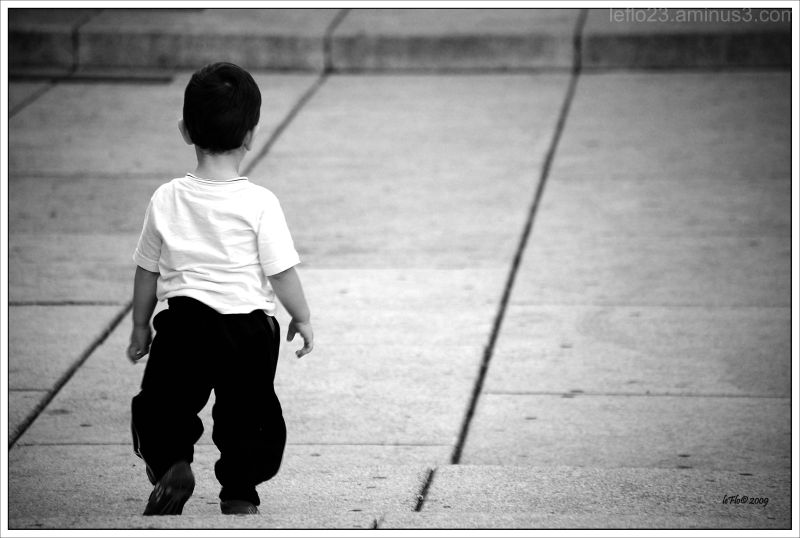 Phillip Moffitt gave a unique twist to one of the periods of Walking Meditation we did at the Retreat-in-a-Box for Care Providers last Sunday. He started with the regular instructions: walk about 10 to 20 paces, back and forth, at whatever speed feels comfortable, paying mindful attention to the lower part of your body and perhaps lightly noting “step, step” or “lifting, moving, placing” to help keep your attention on your body. But then he added:
Phillip Moffitt gave a unique twist to one of the periods of Walking Meditation we did at the Retreat-in-a-Box for Care Providers last Sunday. He started with the regular instructions: walk about 10 to 20 paces, back and forth, at whatever speed feels comfortable, paying mindful attention to the lower part of your body and perhaps lightly noting “step, step” or “lifting, moving, placing” to help keep your attention on your body. But then he added:
Before you start the actual walking practice, stand for a minute and silently ask yourself this question: What would be most nourishing for me as I perform my role as a care provider? (Or: What do I need to do to take care of myself? Or whatever question comes into your mind.)
Ask the question silently 3 times, then drop it (as best you can). Start your walking meditation, as instructed. Don’t try to come up with an answer. If the question comes back into your mind, try to let it go. Turn your attention to the noting: “step, step,” or “lifting, moving, placing” etc. Do the same if you find yourself trying to answer the question. Just do the normal practice. Then, when the walking period is over, stop and silently ask yourself the question again. Wait for a moment and see what happens.
He said that he has used this practice on several occasions, particularly when he needed to make a decision and couldn’t find any practical/rational basis on which to make it. Sometimes, nothing happens. But often it does. Sometimes the answer presents itself immediately and it’s not what you would have expected, but you recognize it and you know the truth of it. Sometimes nothing comes right away, but you feel like something in you has shifted. And sometimes, you realize you were asking the wrong question!



